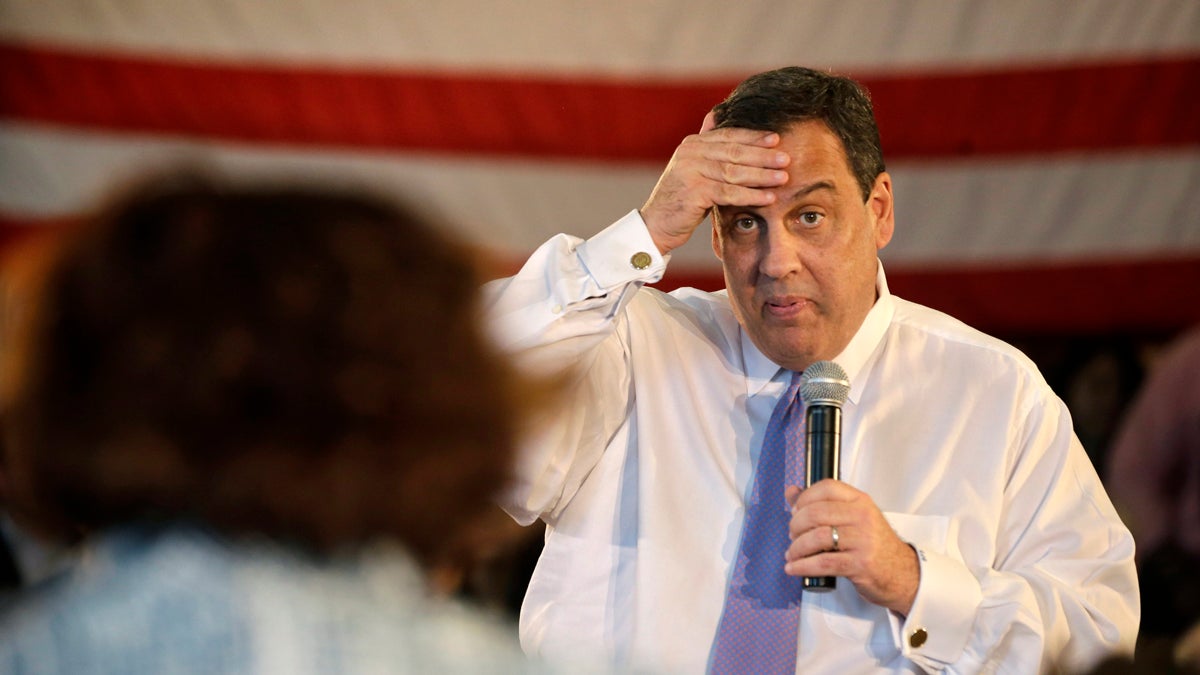NJ contract linked to Christie brother unlikely a violation of ethics code, expert says

New Jersey Gov. Chris Christie listens to a question during a town hall meeting last week in Hasbrouck Heights. (Mel Evans/AP Photo)
A new report shows that some of the money meant to help save Atlantic City will go to a firm that employs the brother of New Jersey Gov. Chris Christie.
But one expert says that even if that decision isn’t necessarily a violation of state law or policy, it wouldn’t be raising eyebrows now if Christie had disclosed the connection from the beginning.
“Todd Christie has a right to pursue a livelihood, even within the geographic area that his brother casts a large shadow on,” said Michael Santoro, a professor at the Rutgers School of Business, who said his initial look at the details of the story suggest that the state’s code of ethics wasn’t violated. “We don’t want to turn these kinds of inquiries about conflicts of interest into witch hunts, either against a sitting governor or against the family of a sitting governor.”
It’s proper for the public to raise questions about such relationships, Santoro said, and appropriate for other government bodies to investigate if they feel it necessary.
“In general, conflicts are a sort of unavoidable part of life,” he said. “A lot of the time, ethical issues are best dealt with when they’re openly [acknowledged] and managed.”
A records request by the news agency Reuters has revealed that the consulting firm Ernst & Young, which employs Todd Christie, has been hired to conduct a financial analysis of Atlantic City. The deal, worth about $250,000, is the third contract the firm has won from the state of New Jersey since Todd Christie started working there two years ago. The connection was first reported Tuesday in the International Business Times.
New Jersey’s code of ethics prohibits public officials from making decisions that “benefit” family members, so “you can understand why people are looking at this deal really closely,” Santoro said.
But unless “further facts come out” showing an actual quid-pro-quo exchange, Santoro said, it is unlikely that the Atlantic City contract would violate the state’s code of ethics.
Governor denies improper dealings
The Christie administration and Ernst & Young both have denied any improper deals, saying that Todd Christie is not working on any state business and that Ernst & Young is fully qualified to analyze Atlantic City’s books. The Christie administration and Todd Christie have not answered questions about whether the governor and his brother discussed the deal personally.
Santoro stressed that while the code specifically prohibits certain quid-pro-quo arrangements, it doesn’t prohibit the kind of informal networking that can shape contracting decisions.
“It’s a fact of life that people hire people who have connections to other powerful people,” Santoro said. “That soft influence is part of the landscape of business and government. It’s not one of the more attractive aspects, but it’s there.”
Santoro said he’d recommend stronger legislative oversight of these sorts of potential conflicts; among other things, he said, Christie should have disclosed the family connection upon approving the contract, rather than wait for the press to discover it.
The sooner such information is released, the less likely the public is to leap to what could be unwarranted conclusions, he said. “Conflicts can be very gray,” Santoro said. “The idea is not to avoid them, but to understand them.”
Christie popularity is ebbing
This is particularly important for a leader like Christie who has been dogged by a steady stream of allegations and investigations, Santoro said, starting with Bridgegate last year. A new poll from Rutgers shows his approval and favorability ratings sliding to historic lows, even as Christie lays the groundwork for a run at the Oval Office.
The poll found that just one in five New Jersey voters thinks the words “trustworthy” or “fair” describe Christie “very well.” A growing number of voters would describe him as “arrogant” or “stubborn,” and only a quarter think he’d make a good president.
David Redlawsk, head of Rutgers’ Eagleton Institute of Politics, which conducted the poll, said it’s not just Democrats who have fallen out of love.
“The biggest surprise maybe in the poll is how negative Republican voters have become about the governor,” Redlawsk said. “He could do no wrong in the post-Sandy world. But really in the last year, since Bridgegate, things have changed.”
While most Republicans still see Christie as a strong leader, Redlawsk said just 37 percent would describe him as “trustworthy.”
Among all New Jersey voters, just one in four thinks Christie would make a good president.
Redlawsk says many voters are put off by Christie’s all-but-declared presidential run.
“One thing that does jump out at us is that New Jersey voters would rather he paid more attention to New Jersey and less to his national ambitions. That’s driving a lot of this,” he said. “But in addition, voters are just really dubious on a range of issues … they’re not happy with his performance on taxes, the economy, or the state budget for example.”
Christie, still officially in exploratory mode where the White House is concerned, just finished a nine-day visit to New Hampshire, and his political action committee has named a former aide to the 2012 Republican presidential nominee, Mitt Romney, to head Christie’s Iowa campaign.
Disclosure might have prevented controversy
Back in New Jersey, the top Democrat on the state Legislature’s investigative committee, Assemblyman John Wisniewski, said there were no plans for immediate action, but that he has plenty of questions he’d like answered.
“I’m not sure I’m in possession of enough facts” to judge whether Christie violated the spirit or letter of the ethics code, Wisniewski said.
But, he added, “anytime you have an organization that involves a family member of the governor being the beneficiary of an executive action, that deserves scrutiny. That scrutiny may be the issuance of a couple of public record requests, or writing a letter and asking some pointed questions. Or it might require more. But we ought to ask the questions and understand the details.
“If there’s obfuscation … if there is an unwillingness to be candid … then we ought to consider what the next steps will be,” Wisniewski said.
And, like Santoro, he thinks the governor would have been well-advised to reveal the Ernst & Young contract and his brother’s connection to the firm as soon as the deal was signed.
“Getting the facts out first is always a preferable strategy in government,” Wisniewski said. “Even though he may not be required legally to make that disclosure, he would have been erring on the side of caution … when you don’t [disclose], it has the unfortunate tendency to look like it was deliberately concealed.”
WHYY is your source for fact-based, in-depth journalism and information. As a nonprofit organization, we rely on financial support from readers like you. Please give today.




